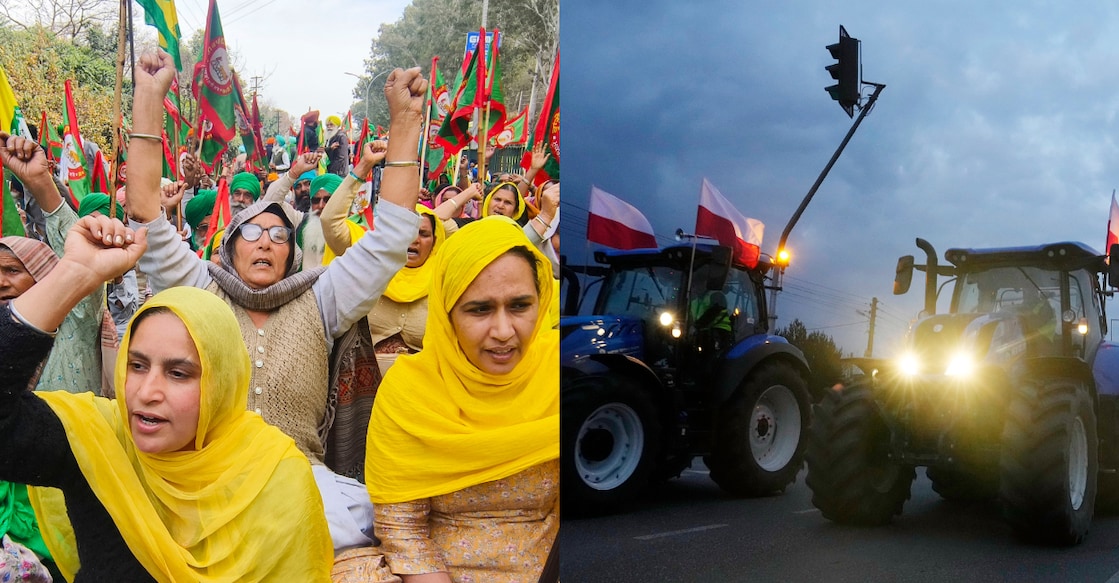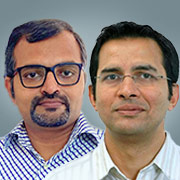Column| Farmers' protest: From Europe to India

Mail This Article
In the past few weeks, farmers' protest movements have gained momentum across several European countries. Throughout Europe, aggrieved farmers are mobilising, leaving their fields behind, and marching into cities to directly voice their grievances to national governments and the European Union (EU). These demonstrations involve farmers from all major EU countries.
Amid weeks of continent-wide farmers' protests, on February 26, approximately 900 tractors jammed the European Union headquarters in Brussels, where EU agricultural ministers were convening. Demonstrators barricaded official buildings, strewn tires across the streets, and ignited them in flames.
The signs point to a growing intensity of the farmers’ demonstrations in the coming days. “We will fight in the autumn months. We will fight in the fields and in the streets,” declared a young farmer leader from Wales, echoing Winston Churchill’s famous speech during World War II.
Battlefields
Protesting farmers primarily demand the cessation of international free-trade agreements and regulation of the European market. "We have to break free from the neo-liberal logic, where prices are far too low and don’t cover our production costs. We demand floor prices – prices that necessarily cover our production costs – so that we can make a living from our trade," explained Morgan Ody, General Coordinator of Via Campesina, a movement that champions the rights of farmers globally.
Farmers direct their grievances towards the European Union. These include opposition to EU directives on climate change, such as greenhouse gas reduction initiatives; objections to granting Ukraine special access to EU markets; and resistance to increased food imports from non-EU countries like Brazil. Polish farmers, who are blocking Ukrainian trucks from entering their country, complain that cheap agricultural imports from Ukraine are undercutting their livelihoods.
The primary concern arises from the EU's sustainable agricultural model, particularly concerning the ‘Farm to Fork’ Strategy, which serves as the cornerstone of the European Green Deal. The central objective of the ‘Farm to Fork’ Strategy is to attain a sustainable food system, which is environmentally friendly and contributes to the mitigation of climate change, and to prevent the decline of biodiversity. Many farmers in Europe feel that their interests are being overlooked as their national governments prioritise environmental goals mandated by the EU.
Farmers demand subsidies from the government to sustain agriculture in a cost-effective way. A dairy farmer in Southern Belgium, speaking to DW News, reveals, “We would like to be able to live without subsidies and just have reasonable prices. But that is not possible right now.” Additionally, the farmers are demanding the reduction of red tape and expressing a preference for simpler regulations in the agricultural sector.

Political undertones
Farmers' protests have already begun to change the political landscape of European countries. For example, in the Netherlands, which is a major exporter of agricultural products, farmers were unhappy with the rules on limiting nitrogen emissions and the goal of cutting them by 50% by 2030. This gave rise to a new political force called the Farmer-Citizen Movement, known locally as BBB. This party surprised everyone by winning the most votes in the Dutch provincial elections in March 2023. The majority of the dissatisfied farmers then shifted their support to Geert Wilders’s Freedom Party, a nationalist and right-wing populist group that won the general elections last year. Far-right parties in other European nations have also begun leveraging the voices of farmers for their own agendas.
“Nearly all of the protesting farmers are white Europeans living in the countryside, who are sceptical about the inclusive and assimilative policies of the European Union and their national governments. They also adhere to conservative values, making them vulnerable to far-right ideologies if they succumb to an external shock, as has happened now,” says academic Thomas Mohan, who studied public policy at the University of Maastricht in the Netherlands.
Concessions to farmers started pouring in as elections to the European Parliament are scheduled for June this year. The EU has already shelved the anti-pesticides proposal, taken steps to reduce the bureaucratic burden on farmers, planned protective measures for European farmers against cheaper Ukrainian imports, and diluted the proposal to allow land to lie fallow to enhance biodiversity. Belgium’s Deputy Prime Minister David Clarinval has stated that the EU is currently considering more 'ambitious proposals' to address farmers' concerns.

Indian parallel
While the fully mechanised and increasingly automated agriculture of European farmers differs vastly from that of Indian farmers, notable similarities exist between the ongoing farmers' protests in India and Europe. Indian farmers protest primarily to secure a legally guaranteed Minimum Support Price for all crops, whereas European farmers aim to obtain state support through subsidies. Similar to their European counterparts, Indian farmers feel that their governments aren't listening and they feel excluded from the policy process. Both groups strongly oppose the 'urban bias' in agricultural policies, wherein urban-based policy planners, lacking an understanding of rural farming challenges, take control of agricultural management. Just as in Europe, rising costs in agriculture are a major concern for Indian farmers as well.
However, the situations in India and Europe differ substantially in various aspects. In the European Union, approximately 4.2% of the total workforce is engaged in crop and animal production, while in India, agriculture provides employment to nearly 44% of the workforce. To a significant extent, Indian farmers are battling for their subsistence, whereas their relatively prosperous European counterparts are fighting for both economic well-being and the preservation of their cultural identity.
The paradox lies in the fact that although European farmers are numerically fewer, their protests are highly visible, tolerated by the governments, and they are achieving their desired outcomes. Conversely, the farmers' protest in India is not as visible despite the significant proportion of the population involved, being suppressed to a great extent, and they are not receiving the desired concessions from the government.
The electoral implications of the farmers' protests in Indian politics remain uncertain. The 'farmer' has historically held significant electoral sway in India’s political landscape – from the poll symbols of various political parties to slogans like 'jai kisan'. However, the political undertones of the ongoing farmers' protests in India, as well as those of the uprisings during 2020-21, are yet to unfold.
Do Indian farmers wield reasonable electoral influence at the national level, akin to their counterparts in Europe? The 2024 Lok Sabha elections will serve as a litmus test.
(Social anthropologist and novelist Thomas Sajan and US-trained neurologist Titto Idicula, based in Norway, write on politics, culture, economy, and medicine.)


